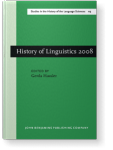Tradition versus grammatical traditions
Considerations on the representation of the Russian language
In the history of linguistics, the cumulative model of knowledge often hinges on the notion of tradition, whose purpose is to extract lines of force, identifiable a posteriori, through traces which, by accretion, have formed them (texts, various linguistic tools). But if these grammatical traditions provide a convenient instrument due to their empirical character and their openness to comparison, they are nevertheless disputed as carrying a continuism suspected of being a projection. In order to discuss this notion of tradition more accurately, this paper will rely on the corpus of the grammatical thought in Russia in its full extent. It will explore how historical consciousness supported the construction of a representation of the national language still in force today. This principle is reasserted in the federal act of 2005, which reinforces Russian, in its normative dimension anchored to literature, as the official language of the Russian Federation.
